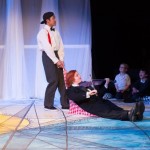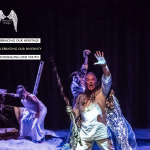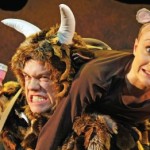Why World War I poets are revered in English Literature while World War II poet Keith Douglas is largely forgotten poses an interesting question about our cultural values. A promising idea, however, is left unrealised in Shane Burke’s Forget Me Not. At the Tea House Theatre.
The question of who and what we choose to remember, either individually or collectively, can be puzzling to say the very least! However, a visit to the Poet’s Corner of Westminster Abbey commemorating sixteen World War I poets leaves little doubt that we continue to remember them; Wilfred Owen provides the epitaph: “My subject is War, and the pity of War. The Poetry is in the pity.”

What remains inexplicable, however, is that while Owen’s Anthem For A Doomed Youth continues to ring out the heroism of young men who died “as cattle”, his poignant representation did not stop the “wailing shells” starting up again, calling young men to war in 1939. As one of those young men, Shane Burke’s character of Keith Douglas complains to his literary agent’s secretary that Owen and others left his generation little more to say about young men in war.
Bete Noire Productions’ current production at the Tea House Theatre in Vauxhall centres on Douglas’ urgency to say something different that those World War 1 poets. The play is set in 1944, just before leaving for the frontline. Directed by Sasha Roberts, the play is a two-hander, with Tom Worsley depicting Keith Douglas and Annabella Forbes playing the literary agent’s secretary, Betty Jesse. However, while the one-act drama raises expectations about coming to know Douglas and his poetry, it doesn’t come near to realizing that end, and instead falls back on a clichéd presentation of an English officer meeting a respectable women.
Emil Zola advised writers that it was the use of “significant detail” which make a good presentation of naturalism on stage, and Forget Me Not disobeys the rule. Insufficient budgets aside, it is the contradictions in the production that let it down the most: for instance, while Tom Worsley wears an unbelievably beautiful authentic World War 2 uniform, Annabella Forbes is dressed completely out of times. While he is groomed authentically, with the right hairstyle and moustache, she is seen with a casual bobbed hair style held with a couple of small clasps. Ironically, as if to puzzle the audience even more, the image of Betty Jesse in the theatre programme shows a decidedly well groomed woman who took much pride in her coiffure. Furthermore, the character is wearing silky stockings in 1943 at a time notorious for incredible austerity and widespread non-existent hosiery!
The flaws in the depiction of Douglas, Jesse and the 1940, however, went beyond mere appearances into problems of characterization. I thought Tom Worsley did his best to work with the straightjacket he seems to have been contained in as he plays the highly-strung Douglas. He shows energy and determination in carrying some sense of a through line as he battles to secure a contract for his poem’s publication. Annabelle Forbe’s portrayal of Betty Jesse, on the other hand, lacks direction of any kind: she is totally unbelievable as a strongly determined woman who, the dialogue reveals, is deserted by her husband for loving her work more than wanting to be a stay-at-home wife and having babies. What’s more, what is the logic of portraying her a dry, prissy spinster to whom the “four-times engaged” Douglas becomes attracted?
What was the play really trying to show? Was it really about the attraction of a man and woman meeting in wartime, or was it about Douglas’s desperation to have his poetry published before going off on D-Day and dying on a beach in Normandy, aged 24? I left the theatre none the wiser.
Certainly, I was drawn to Bete Noire Productions and playwright Shane Burke’s interesting subject matter of a drama on the life and poetry of Keith Douglas. However, I don’t believe the biographically cluttered dialogue did their subjects any justice. Another treatment is needed to build on the issues with which Douglas grappled, most notably how, in times of war, humans live on and sometime revel through how love and death exist in such close proximity.
I’m not an expert on war poets, but I suspect that it is this vibrancy in Douglas combining sex and death which makes his poetry somehow more shocking to read than the World War I poets. The theatre program hints at this in his writing of the poem in “Vergissmeinnicht”(trans. Forget Me Not) which tells how, coming across a dead German soldier’s body decomposing in a blown up tank which still displays on a metal panel a photograph of his lover “Steffi”, Douglas writes:
But she would weep to see today
how on his skin the swart flies move;
the dust upon the paper eye
and the burst stomach like a cave.
For here the lover and killer are mingled
who had one body and one heart.
And death who had the soldier singled
has done the lover mortal hurt.
Shane Burke and Bete Noire Productions are right, such sensibilities are the stuff of great theatre. The hard truth is that on this occasion they did not fulfill their own high expectations of realising such a drama.
Date reviewed: Wednesday 17th July 2013






